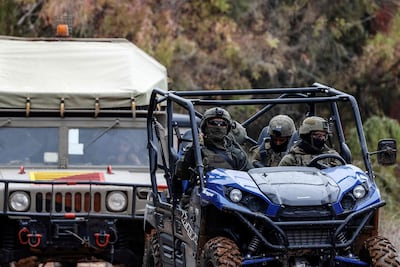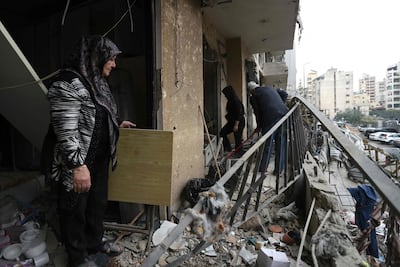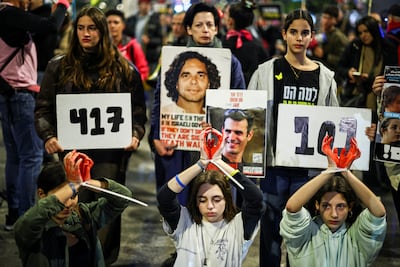Live updates: Follow the latest on Israel-Gaza
Residents of northern Israel have criticised a ceasefire deal with Hezbollah that came into effect on Wednesday, saying it does not do enough to secure long-term safety in the area.
The deal, announced by US President Joe Biden, began at 4am local time and is designed to be a “permanent cessation of hostilities” between Israel and Hezbollah. The deal was approved by 10 Israeli ministers in a cabinet meeting on Tuesday night, with only one opposing, the far-right National Security Minister Itamar Ben-Gvir.
It has nonetheless been fiercely criticised by many of the 60,000 residents of northern Israel forced to evacuate when the Gaza war broke out due to rockets fired by Hezbollah, while officials and politicians say it leaves the region vulnerable to the same threats posed by the group before the war and could soon collapse.
Metula Council head David Azoulay, who represents one of the most destroyed areas in the north, told Israeli broadcaster Channel 12 he would not advise residents to return and described a meeting he held with Prime Minister Benjamin Netanyahu late on Tuesday evening as a "a one-sided spectacle”.
"We are now entering a situation far worse than October 6, they're misleading us,” he added, referring to the long-standing fears of northern residents about Hezbollah's military build up in the region before the Gaza war began.
Father of two Tzahi David Hafsadi, 34, a resident of Kiryat Shmona, northern Israel, said his family “does not feel good about the idea”.

“I have no problem with a ceasefire but I don’t think we should stop now," Mr Hafsadi added. "I paid a price, my family paid a price, my community paid a price. I feel like we didn’t finish the job, so I don’t know why we paid this price."
Moran Brustin, 39, a mother of three who returned to Kibbutz HaGoshrim, echoed Mr Hafsadi, saying: “It’s a problem that we stopped the war and didn’t finish the job.”
“I don’t support war but it seems like nothing changed. There was a siren a few minutes ago and I had to put my kids on the floor and lie on top of them because we don’t have a safe room in the house. We need to trust our army but I think that after October 7 that’s hard, because there was no one there."
Hezbollah started launching rockets into Israel a day after Hamas attacked southern Israel on October 7, prompting the Israeli government to arrange a mass evacuation in which tens of thousands of Israelis who lived on the border with Gaza and Lebanon move into government-funded accommodation.
Now, after 14 months of limbo and a ceasefire deal that many find unsatisfactory, many residents say they will return home despite the dangers because the toll of being away has become too great.
Ms Brustin said her family decided to make the “hard and weird” choice to return – even though her house now offers no shelter and, given its proximity to the border, gives them only seconds to respond to incoming rocket fire – because it was “good for my family”.
“I know there are lots of problems in families now where one parent wants to come back and the other doesn’t, causing a lot of troubles,” she added. "There’s a lot of divorce because of this."

Mr Hafsadi said he wants to go back to Kiryat Shmona to restart his business but his wife, who is from Jerusalem where the family is currently staying, does not.
Israel has said it is committed to gradually withdrawing troops from southern Lebanon over the 60-day ceasefire, although military officials stressed on Wednesday that this would be gradual and that the security situation would be monitored constantly for violations.
According to the truce, Israeli forces are supposed to then be replaced by troops from the Lebanese army, although there is little trust in the Lebanese state among Israelis, who say it, along with UN peacekeeping forces, have proven in recent years that they are incapable of standing up to Hezbollah's military build up on the border.
Only hours after the agreement came into effect, Israeli troops opened fire on Lebanese who they deemed to be suspicious. Throughout the day, more reports have been emerging of similar incidents, throwing into sharp relief how vulnerable the cessation of hostilities is as thousands of Lebanese people return to their homes in the south.
Devora Ivgi, 71, a resident of Avivim where her house was destroyed by two rockets, said she was “sick and tired of not being at home” but she would feel safe only when she knows she “won’t be kidnapped by Hezbollah”.
“The fact that I live on one of Israel’s borders should not make me feel any less safe than I would feel in Tel Aviv,” she added. “I need a buffer zone with our troops inside. Most important of all, I can put my safety in no one else’s hands other than my country’s.”
Many Israelis have hit out at the deal for failing to address the stalemate in Gaza where about 100 Israeli hostages, many of whom are dead, are still being held, one of the most important and traumatic political issues in the country since the war began.
Orna Weinberg, 58, a farmer from Manara and mother of four, said the hostages remain the “first thing on my mind”. She added: “Hezbollah tied itself to Hamas when the war began. I think it’s a grave mistake to untie this linkage."

“It means we are abandoning our people who are suffering in Hamas tunnels. It’s unbreakable. It’s worse than having kids fighting in the army, than being uprooted.”
There were hopes among international mediators that a ceasefire in Lebanon could create a path for a similar deal in Gaza. Egypt, which is playing a central role in trying to bring about peace in Gaza, joined a chorus of countries who welcomed the deal, saying it could lead to a broader de-escalation.
French Foreign Minister Jean-Noel Barrot told Franceinfo radio: “Force must give way to dialogue and negotiation. This has now been achieved in Lebanon and it must happen as soon as possible in the Gaza Strip.”
In Jerusalem, residents were more welcoming of the deal. One Israeli man, who did not want to be named, said: "I hope it's a good thing but I don't know. I hope it will give people wisdom to end the war."
An Armenian-Palestinian pensioner said: "We need this ceasefire a lot. People are paying too much. The genocide is not fair."


